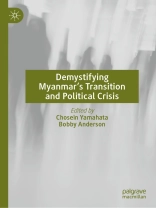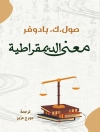This book offers the assessment of Myanmar’s societal changes, development aspects, and political situation over the course of the nation’s short lived democratic transition disrupted by the coup d’état on 1 February 2021. A multitude of authors with different expertise add new dimensions of analysis to provide a foundation for any future international cooperation in Myanmar’s center and peripheries. The military’s institutionalization of its influence and control in political, economic and social affairs has negatively affected the safety, security and peace of people and their communities at the periphery. This in turn has led the people to undertake local grassroots initiatives towards securing a genuine democratic transition at the local and national level.
The chapters probe into Myanmar’s transition and political crisis through in-depth discussion on the issues such as, but not limited to, state fragility, community resilience, political leadership, ethnic women’s organizations, human security, education equality, IDPs and non-state actors, ethnic community-based health organizations, the 2020 election, peace process, development issues, the coup’s destruction, and a new-born unity. The book covers an important collection of inputs from young and prominent scholars alike, offering a valuable resource for general readers, students, and practitioners.
The editors present this volume as a vital collection to literature at a time of heated political crisis and societal responses on her current course since the contributors highlight the state of Myanmar by also focusing on the margins, the grassroots, and the recent coup.
قائمة المحتويات
1. Beyond the Centre: Democratic Transition, State Fragility and Community Resilience (Chosein Yamahata & Bobby Anderson).- 2. The Role of Aung San Suu Kyi in Myanmar’s Transition (2011-2021)(Michaeł Lubina).- 3. Human Security and the Role of Ethnic Women’s Organisations in Transitional Myanmar(Makiko Takeda & Chosein Yamahata).- 4. Evaluation of the Equality of Education on Basic Education Standard in Chin State, Burma/Myanmar(Khen Suan Khai).- 5. Non-State Actors on the IDPs in Kachin: Provision of Humanitarian Assistance and Protection of Justice (D Moon Awng).- 6. Public Health Reform, Transition and Ethnic Community-Based Health Organisation (ECBHO) in Borderland: From the Eastern Burma/Myanmar (Voravit Suwanvanichkij & Saw N. Htoo).- 7. Redrawing or Blurring the Boundary? Observations of Naga People’s Political Struggles and Local Cross-Border Trade Practices (Satoshi Ota).- 8. Myanmar on the Road towardsthe 2020 Elections: A Pre-Electoral Assessment Press.- 9. The Politics of Space: Naypyidaw and the Ghosts of Yangon(Donald M. Seekins).- 10. Myanmar’s Peace Process and Ceasefire Monitoring Mechanism: A Post-Mortem.- (Saw Chit Thet Tun, Bobby Anderson & Chosein Yamahata).- 11. A Paradise Lost in the Indo-Pacific? Great Power Politics and International Relations of the Myanmar Tragedy (Jittipat Poonkham).- 12. Difficult Development Trade-Offs amidst Myanmar’s Transition: Exploring Power and Politics in Post- 2010 Myanmar.- (Patrick Meehan).- 13. The World is not “Flat”: Limits to Development and Control on a Burmese Periphery (Bobby Anderson).- 14. Patterns of Japanese Development Assistance for Social Transformation in Reform-Era Myanmar(David M. Potter).- 15. Restoring the Culture of Peace in Locals: Agent of Change from Myanmar’s Periphery(Makiko Takeda).- 16. Myanmar is at a ‘Point of No Return’: Unity Reborn Despite Junta’s Terrorisation (Chosein Yamahata).
عن المؤلف
Chosein Yamahata is a professor at the Graduate School of Policy Studies, Aichi Gakuin University, Japan. He coordinates the Academic Diplomacy Project (ADP), under which he recently co-edited Social Transformations in India, Myanmar, and Thailand: Social, Political and Ecological Perspectives (2021), and Rights and Security in India, Myanmar, and Thailand (2020). He is also a visiting professor at Chiang Mai University’s Faculty of Mass Communication and teaches the Master of Asia Pacific Studies program at Thammasat University. Dr. Yamahata promotes academic collaborative platforms including Burma Review and Challenges International Forum (BRACIF), Asian University Network Forum on Advances in Research (AUNFAIR), and the Thailand-India-Japan Conclave (TIJC).
Bobby Anderson is a research fellow at Chiang Mai University’s School of Public Policy, where he specializes in the historical impact of opium eradication programs. He is a project manager, policy adviser, a lifelong student of political economy and ethnography, and a specialist widely published in community development, governance, markets, conflict, and crime. Anderson also worked in other projects with USAID, the Australian Department of Foreign Affairs and Trade, the World Bank, and the International Organisation for Migration, amongst others, in countries including Afghanistan, Indonesia, Myanmar, Timor-Leste, and the former Yugoslavia. He was a fellow, a scholar and research associate at Chulalongkorn University, at the NUS’s Lee Kuan Yew School of Public Policy, and at the School of Oriental and African Studies, respectively.












